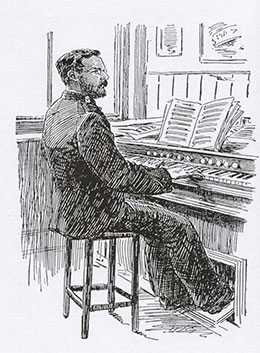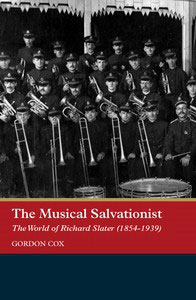Gordon CoxAs I was approaching retirement from teaching at the School of Education, University of Reading, I began to formulate plans to write a book on the history of Salvation Army music. I had been raised in the Salvation Army, and received a rich, informal musical education within its bands and choirs. I became acutely aware that this musical world with its spontaneity and informality seemed separate from the musical culture into which I was being inducted through piano lessons and music theory. On leaving school I gained a place at the Royal Academy of Music, and this sense of inhabiting two different musical worlds increasingly intrigued me. By the time I completed my studies I was no longer a Salvationist, but my experience within the movement triggered a lifelong fascination with such matters as the relationships between music and religion, music and social change, and informal styles of music making and musical education.
In planning my research, the first step was to immerse myself in the wealth of published Salvationist periodicals, and instrumental tutors and pedagogical texts. The most intriguing work that I came across was the Salvation Army Dictionary of Music [1908] written by Richard Slater (1854-1939), well-known in Army circles as ‘Father of Salvation Army Music’. I became intrigued by this man’s sense of vision and energy. The problem was that all my sources were ‘official’ ones. I needed to search out primary sources that would provide scope for encountering honest debate. |
|
Richard Slater
Meanwhile, my successful application for a Finzi Scholarship coincided with a discovery I had made of the whereabouts of Richard Slater’s diaries. This proved to be a turning point in my quest. Held in the possession of Slater’s great-grand-daughter, Stella Taylor, I was kindly granted access to work on the 24 volumes of these diaries which covered the whole of his life in considerable detail. In order to work on them I had to travel a considerable distance to Stella’s home, on numerous occasions. The Finzi Scholarship provided the funds for me to cover my travel and accommodation costs, and this was invaluable. As a result of finding the diaries I expanded my original intention, and used Slater’s life story to provide an effective frame for a wider history of Salvationist music-making. After numerous revisions and drafts, the book was accepted by the Boydell Press, to appear in their prestigious ‘Music in Britain 1600-1900’ series. It was published in 2011, as ‘The Musical Salvationist: The World of Richard Slater (1854-1939) Father of Salvation Army Music’. I will always be indebted to the Finzi Trust for its support in enabling me to bring a long-cherished project to fruition. Gordon Cox [email protected] |



